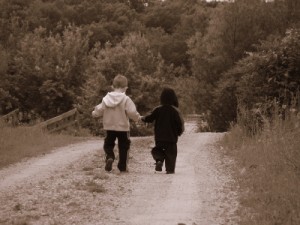 Sometimes I wonder if those who were in charge at the various training centers really thought about what they were doing when they put young people “in charge” of other young people. I know that age does not always matter when it comes to authority and respect, but it can sometimes be very important.
Sometimes I wonder if those who were in charge at the various training centers really thought about what they were doing when they put young people “in charge” of other young people. I know that age does not always matter when it comes to authority and respect, but it can sometimes be very important.
There were four of us girls put on a “leadership team,” all in our early 20s, charged with the task of creating an urban-based, mission-oriented program for apprenticeship students. The idea was that mornings would be for studying, assigned reading, and group discussion, and afternoons would be filled with service. We hoped to line up opportunities in the community, but if not, there was always work to be done around the training center.
I am not really sure how I was picked to be a “staff member”, but I was always glad that I had been. As a part of this team, I was trusted more—though I had done nothing to prove my trustworthiness. Being quite a bit more reserved than the other three girls, and liking being behind the scenes more than being out in front of people, I was put in charge of ordering books and supplies and setting up the curriculum plans. The task often seemed overwhelming, but I loved the challenge and felt that I thrived in my duties. I really had no desire to talk in front of groups or be the one who had to confront or correct wrong behavior. Usually, this was not a problem and I was able to stick to my organizational duties. However, I remember one particular encounter vividly.
A group of our ministry students had bonded very well with each other. This small group consisted of both guys and girls, which was reason enough to suspect them of mischievous intent. From the point of view we had then, their group was cliquish and they were always suspected of doing devious and rebellious things. I’m not sure how the suspicions started, or even if those suspicions were well-founded, but this group always seemed to be in trouble for something or other.
One day, after several incidents had occurred, it was decided that those of us who were part of the leadership team needed to have heart-to-heart talks with some of the girls in this group, on a one-on-one basis. The girls were divided up among the four of us leaders. I knew some of the offenses, but I personally didn’t think that these girls were always in the wrong. However, I wanted to do my job and be a good leader, so I psyched myself up to have a talk. I’d been taught all my life that respecting authorities and submitting to them was one of the highest qualities that a person could possess, and this thought influenced everything I did. This kind of obedience was akin to doing the will of God.
That afternoon “Lacey” came to our little office. My stomach was in knots. I didn’t want to talk to her, and I hardly knew where to begin or what to say. I think I remember these words (or something like them) coming out of my mouth: “It seems to us that you have a problem with authority.”
Lacey looked highly offended and very shocked. She protested, strongly, but graciously. I don’t remember what all was said, but I have distinct impressions of the feelings. She was extremely upset. She felt completely misunderstood and un-trusted. I felt inadequate to be talking to her, and I didn’t want to offend her, but I felt it was my duty to do what I’d been instructed to do. My words came out haltingly and there were long, awkward pauses. The only people I’d had to correct in my lifetime were my younger siblings, and that was easy. However, I wasn’t experienced or trained in how to counsel people about attitudes and behaviors. Especially not people my own age.
Eventually, the conversation ended, she left, and I wondered what she thought of me. I didn’t want her to dislike me or avoid me after this. I desperately wanted to be liked. Especially by Lacey and her group of friends. They were always so happy and close. I wanted friends like that. I didn’t want to be ostracized because I had been instructed to correct her. In the following days, I didn’t notice any particular differences in our interactions, and she was always gracious and friendly.
Eventually Lacey’s time at the training center came to an end and she returned home. Over time, my rosy view of the training center life and IBLP world became clearer, and I saw things about Lacey and her friends that I had not been able to see before. Most of the students who were part of that group, Lacey included, had incredible relationships with their parents. Having a problem with authority was the least of their problems. The label of “having a problem with authority” that we so quickly stuck to them was very wrong. Instead, they were reacting to the fact that we had demoted them to the status of irresponsible teenagers when they were used to being treated like adults.
Today, Lacey and I are friends. In fact, that entire group is now part of my circle of friends, thanks to their forgiveness and readiness to forget the mistakes of the past and move on. They are some of the most sincere and incredible people I’ve ever met. Their friendship — welcoming me into their group without reservation — is an ever-present example to me of the true grace of God. It’s unexplainable and I am undeserving, but still it is there.

 Sometimes I wonder if those who were in charge at the various training centers really thought about what they were doing when they put young people “in charge” of other young people. I know that age does not always matter when it comes to authority and respect, but it can sometimes be very important.
Sometimes I wonder if those who were in charge at the various training centers really thought about what they were doing when they put young people “in charge” of other young people. I know that age does not always matter when it comes to authority and respect, but it can sometimes be very important.



















Well said...and, I look forward to more.
Liz, I love the line " they were reacting to the fact that we had demoted them to the status of irresponsible teenagers when they were used to being treated like adults." I just realized that is why I was always so confused about the way I was treated at TCs! Funny for a program that told you that you were an adult at 12.
Thank you so much for all you did to be a blessing to all of us at the Character Inn. You were an great help to me and a blessing to many, many young people. I'm with you. I hope that in trying to "run the program" I didn't depreciate the maturity or spiritual vitality of the young people. Our construct of holiness can easily drift off of the gospel to a system that is hard to run.
I strongly believe that the Character Inn was good for the young people who were in the Eternal Vision Program that you helped Pioneer. Don't let your good be evil spoken of :) You did a great job. We poured out our hearts and lives for those young people and I remember the time with great fondness. Your diligence and faithfulness made all that possible.
Thanks for all you did. (Some of the young people even met their life-mates there) :)
Bless you both. -Ken
Mr. P, Thanks for your kind words. My intention in writing is simply to share an inside view of life at a training center, including some of my struggles and mistakes. I hope I am able to convey my thoughts in a way that is not antagonistic. I don’t hold bitterness or resentment towards IBLP, but I am painfully aware that much of the harm and destruction in my family was because of the Institute’s influence and teachings. The time we served at the RCI was definitely instrumental in each of our lives. (and yes, because of my time there, I do have many fond memories, lasting friendships, and my husband!) My experience there was one of the better ones. Each young person involved had an entirely different experience, and no doubt, we all grew because of our time there. Some struggled immensely, and it is for those people that I write, hoping that some will experience freedom from past memories or bitterness. I do want to thank you for giving me the chance to put some needed distance between myself and bad situations elsewhere, and for the opportunities I had to grow. Your teaching also helped me see that there was more to the Christian life than rote and rules... that enjoying Jesus was possible. Hope that you and your family are well!
Mr. P,
Thanks for your kind words. My intention in writing is simply to share an inside view of life at a training center, including some of my struggles and mistakes. I hope I am able to convey my thoughts in a way that is not antagonistic. I don’t hold bitterness or resentment towards IBLP, but I am painfully aware that much of the harm and destruction in my family was because of the Institute’s influence and teachings.
The time we served at the RCI was definitely instrumental in each of our lives. (and yes, because of my time there, I do have many fond memories, lasting friendships, and my husband!) My experience there was one of the better ones. Each young person involved had an entirely different experience, and no doubt, we all grew because of our time there. Some struggled immensely, and it is for those people that I write, hoping that some will experience freedom from past memories or bitterness.
I do want to thank you for giving me the chance to put some needed distance between myself and bad situations elsewhere, and for the opportunities I had to grow. Your teaching also helped me see that there was more to the Christian life than rote and rules... that enjoying Jesus was possible.
Hope that you and your family are well!
This post made me think of something similar - my own parents asked us older children to spank the younger ones. They were essentially outsourcing discipline, because with a dozen or so children, they didn't have the time to do it themselves. Anyway, I think there are some some similar issues in this.
Hey Elizabeth... you can call me Ken :) Mr. P just doesn't quite seem right. I would love to see you and Ryan and your family one day. I hope I can connect with anyone that I harmed or discouraged in any way during my time at the Character Inn. I would be sincere and quick to try to reconcile and restore them. I only wanted to bless and challenge young people at RCI. Thanks again for your faithful work there. The Eternal Vision Program would never have worked without you.
The older I get and the more I see, the more I am convinced that there is no way to improve on the Gospel. Do system or program can touch it.
Blessings, again.
I can't comment on the Character Inn, per se, but again, this was spot on:
"they were reacting to the fact that we had demoted them to the status of irresponsible teenagers when they were used to being treated like adults."
Depending on the TC, add in the factor of Adult-level demands, responsibilities and expectations we were given... while being treated on the whole as a group of hormone-crazed, spiritually atrophied, irresponsible teenagers.
That incompatible, irreconcilable double-whammy of an attitude toward us was something hard to deal with, period.
After finishing 3 years in a training center, I remember sitting in an introductory meeting for the Bible school I'd just enrolled in...
Tears came to my eyes, the contrast was so great: biblical, grace-based expectations of us students as young adults, not juvenile delinquents in the making, assumed innocent until proven guilty, etc. The overwhelming emphasis of love, the desire to nurture, teach, prepare us for a life-long relationship with Christ was expressed in every word. I just sat there, overjoyed, overwhelmed; after three years of the opposite, finally seeing what loving, grace-based interaction could be between young adults and an older generation, in a christian institution.
As a teenager, I was always amazed at the adults (some with adult children) who would call me to ask what answer Bill Gothard had for the crisis they were facing. So, teenager, how would the old bachelor handle my marriage and parenting problems? Ridiculous!
I agree, Teri! It also left me confused and worried when I would talk to these parents who wanted advice on handling their kids. I would think, "Hey, I am practically a kid myself! How can I tell you how to fix something I have no experience with?!"
When I think back on the advice I gave to people back then, I cringe. There's a verse in Proverbs that says it's foolish to answer a matter before you've heard the whole of it. I now think it can also mean that it's foolish to answer a matter when you have no experience with the issue it raises.
How I wish I could go back and ungive advice! I think about it sometimes when I leave my kids with their teenage babysitter. I was her age giving out parenting advice. It's amazing that people actually listened to me!
Yes, Terri and Wendy I agree. When I would call, I would insist to talk to an "adult." It was ridiculous to be a mature adult wanting counsel and guidance and being pawned off on an inexperienced kid. No offense intended, but come on, it is just like you said. What adult in their right mind would put their family's direction for an issue out to a bachelor, or another inexperienced young adult. Ludicrous!! That was just one of the things that alerted me to something being amiss with ATI!
Training Centers, IBLP events, CI staffer, "Headquarters"... Oh the memories. Glad to see some of you finally working through issues as 'adults'. However, to blame ones life decisions on events and outside
forces seems to me to be very child-like. I also had good and bad experiences with ATI, made lifelong friends, blessed and offended more than a few I am sure. This is simply life my friend. The one issue I
have with ATI is that somehow they instilled this "I am so very special and unique" complex into the minds and souls of so many. The life issues that we face are common. They are not 'only found in ATI or IBLP.
In my company, I am in a place of "authority' (sorry to use the "a" word) and have several people under me who are older than me, and some have three times the experience that I have. Is it fair? No.
But this is life... and the boss chose me. And guess what... He has never even heard of ATI or IBLP.
I have met so many former ATI students that are a mess... and still blaming the mess on a
high-school curriculum that supposedly forced them and their families into a life of chaos.
Really? I think that if we are adults we should behave and respond as such.
I am not so very unique. It is something that we must grasp if we wish to relate and influence this
world and the people in it.
twelve years:
glad to hear you came through it ok. Others didn't. The ATI system, specifically in TC's encouraged spiritual abuse at the least. Many have suffered spiritual, emotional, and physical abuse at the hands of parents empowered by Gothard's teaching. We as adults ARE moving on in life, but those experiences of child and young adult hood are and will continue to be something that has shaped us into who we are today. I, for one, have developed a lifelong, extreme aversion to legalism and scripture-twisting in any form. =) Cheers
This brought up some interesting memories. First, of being treated like an LIT (juvenile delinquent) at Headquarters on minute, then being asked to lead a COMMIT team a moment later. Leading a team at COMMIT means being counselor for a mother/daughter conference... something I was nowhere near equipped to handle! I was 19! I was stunned, embarrassed, and bewildered that married women thought I was capable of answering marriage and parenting questions. It still amazes me that the Institute put so many of us in that position without so much as a crash course in counseling first.
I have been a victim of children being in charge at IBLP locations. The person in charge called me out for not doing something I had already done even they had some evidence that I had done what they were falsely accusing me of not doing. He didn't even apologies and asked some unwise questions in unwise manners. He didn't use any Scripture and even forbid me to do something Scriptural. He treated the guys under his charge, some of whom were older than him, as bureaucratic projects instead of souls, spending more time typing check sheets into a computer and actually talking to the guys. He did not have any kind of counseling or biblical certification that I know of, and he was also busy planning parties and finishing his college degree. At lease he had to integrity to step down. I wonder what IBLP /ATI thinks of Isaiah 3:4,12 dealing with children being in charge.